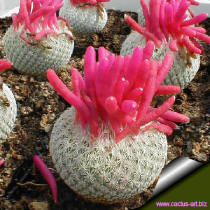|

Epithelantha micromeris |
The
genus name
"Epithelantha" derives from
the Greek word “Epi (επι)”
meaning “upon, on, at,
over”; the Greek word “thele”
meaning “nipple” referring to the tubercles, and
“anthos
(ανϑος)”
meaning “flower”
describing flower position near tubercle apex.
(The genus name implies:
“flowers upon the tubercles”).
For example:
Epithelantha micromeris
|
The Epithelanthas
are slow growing, dwarf cacti covered with minute clusters of white
spines that completely wrap the surface of the plant. Stem usually
globular with a depressed centre that plant resemble a little like a
large white button or a miniature golf balls. Spines are so tightly
adpressed to the epidermis of the plant as to render it completely
invisible. In a few of the forms some of the spines stick out at an
a great enough angle from the plant body to make it seem a little
bristly, but in most the spines don’t resemble spines at all, just a
barely roughened white coating. They are natives of the western U.S.
and Mexico and are found growing in shallow soil on rocky hillsides
among blocks and plates of pure white limestone, barely peeking out
from under the flattened rocks, and, as a result, can be quite
difficult to find. Epithelanthas also mimic the dried deer dung that
shows up in even the driest desert regions, a resemblance which has
perhaps an important survival value.
|
|